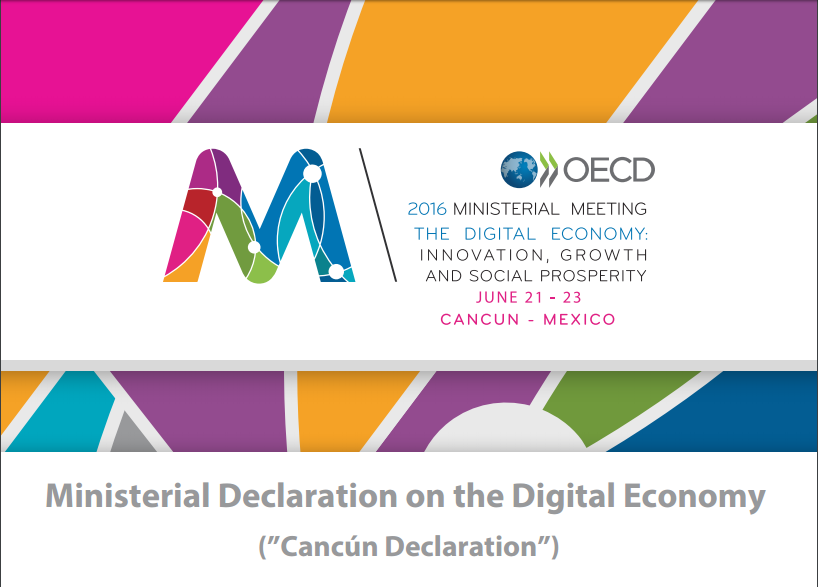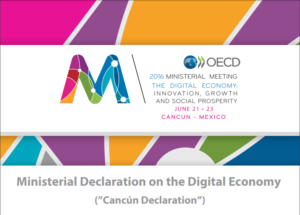
OECD approves Ministerial Declaration on the Digital Economy
Last week, InternetLab participated in the OECD Ministerial meeting held in Cancun. The Ministerial Declaration on the Digital Economy was elaborated and approved at that time.
InternetLab had the opportunity to take part of the event as a member of the Civil Society Information Society Advisory Council (CSISAC), which InternetLab has recently joined.

What is the OECD and what is Brazil’s status in the organization?
The Organisation for the Economic Cooperation and Development (OECD) is an international organization based on democratic institutions that promote policies to improve economic and social well-being of societies. The OECD Convention was signed in 1960 and today has the ratification of 34 members.
Brazil is not a signatory member, but is considered a “Key Partner”, whose cooperation with the OECD dates back to 1994. As a Key Partner, Brazil has access to Partnerships in OECD Bodies, adherence to legal instruments, integration into the statistical reports, and has been invited to attend all ministerial meetings at Ministerial level since 1999.
Committees meetings and Ministerial meetings
OECD meetings take place in two different levels: first, the Committees level, in which the meetings are formed by the delegates designated by the members and, sometimes, with the potential participation of partners and observers. Some of the Committees can be divided into more specialized research groups to facilitate the work of these meetings – those are called Advisory Committees. The Ministerial meetings are in the second level, in which issues of great importance are discussed. From 1962 to 2008, the OECD held 58 ministerial meetings covering topics such as Agriculture, Environment, Education, Health, Digital Economy, among others.
At these meetings, ministers work together to share experiences and seek understandings and solutions to common problems. In addition to government participation, there is also space in the discussions for the business sector, civil society and workers, represented by the OECD Advisory Committees.
What is the CSISAC (Civil Society Information Society Advisory Council)?
The OECD work is divided into different internal committees. The Committee responsible for digital economy admits the participation of civil society in its discussions through the Civil Society Consultative Council of the Information Society (CSISAC). The formal recognition of CSISAC by the Committee was the result of an effort initiated in the 1990s, and today the CSISAC is the main channel to participation of civil society in the OECD work on digital economy.
Besides CSISAC, the Business and Industry Advisory Committee (BIAC), the Trade Union Advisory Committee (TUAC) and the Internet Technical Advisory Committee (ITAC) are part of the committee on digital economy.
Ministerial meeting about digital economy
Issues related to technology are covered by the Organization since its creation. Among several ministerial meetings that discussed the subject, two of them are considered highlights. The first was the Ottawa Conference in 1998, where ministers met for the first time to discuss and develop plans for global e-commerce. In the second meeting, held in Seoul in 2008, the agenda was looking at the future of the Internet – with the recognition of countries on Internet’s essential nature and function. As a result of these commitments, the OECD has become an important source for the development of reference policy and research capabilities in the field.
Cancun meeting
The last OECD Ministerial meeting on digital economy took place between 21 and 23 of June 2016. During the meeting, four major themes were discussed: (1) internet openness and innovation; (2) building global connectivity; (3) trust; and (4) job and skills.
(1) About Internet openness, two panels were held: the first discussed social and economic benefits of Internet, addressing the concept, its importance, and what are the policy priorities in this area. The second panel sought to explore alternatives to stimulate innovation in the digital economy.
(2) Within global connectivity, the first panel discussed how digital convergence affects policies and regulations. The second panel discussed how policymakers could advance and promote positive aspects of the Internet of Things (IoT).
(3) In the digital trust area, the first panel explored the link between consumer confidence and economic growth, discussing how consumer policy can encourage e-commerce. The second panel discussed implementations of security management strategies and the risk of digital privacy.
(4) Within work and technology, the first panel aimed at identifying effective policies to promote job posts in economic activities that use digital economy. The second panel discussed new approaches to education, training and retraining to meet fast-changing demand for new skills in the digital economy.
Academia, civil society and the private sector attended each of the panels along with representatives of member countries of the OECD.
Statements and other legal instruments
The OECD work is based on continuous monitoring of events in member countries as well as in non-members, and includes regular projections of economic developments. After the data collection and analysis, the Organization prepares decisions and recommendations to members.
Decisions are legally binding for all Member States who did not abstain at the time they are adopted. In other words, members are required to apply the decisions and take the necessary steps for its implementation. Recommendations are not legally binding, but there is an expectation that members will do their utmost to fully implement the content of the recommendations.
Among other legal instruments developed within the Organization are the statements, as those elaborated in the last meeting in Cancun. These documents are solemn texts that establish relatively precise political commitments and are signed by the governments of member countries. They are not official acts of the Organization and they are not intended to be legally binding, but they are noted by the OECD Council and their application is usually monitored by the responsible OECD body.
Declaration drawn up in Cancun
The Declaration on Digital Economy prepared at the last meeting in Cancun summarized the main discussions that took place at the event, listing guidelines and conclusions in a single document.
Among the main objectives of the declaration, there was consensus on encouraging innovation, creativity and knowledge sharing, in order to free flow of information on the network, but stressing the need to protect the privacy and freedom of expression. The increased connectivity of broadband or even promote emerging technological opportunities (such as the Internet of Things or storage clouds) were also targets drawn up by the statement.
The promotion of digital security risk management, in order to stimulate both the reduction of impediments to e-commerce, such as the provision of public data – aiming at the use of the opportunities arising from online platforms – was also part of the agenda.
From an economic point of view, the importance of the adoption of stimulus of digital technology in the sector was highlighted, promoting the creation of jobs in the area and reducing barriers to investment. In this sense, the need to undertake efforts to improve education and training systems of the digital economy to society was also mentioned.
The Declaration also expresses a commitment to promote cooperation among all stakeholders to develop privacy protection strategies that combine innovation opportunities with the protection requirements in different jurisdictions. At this point, it is important to monitor future discussions and movements taken over by the OECD to maintain privacy as a relevant concern.
The CSISAC prepared a statement evaluating the event from the civil society`s perspective. As a CSISAC member, InternetLab participated with the other representatives of civil society in the discussion process of the terms of the declaration.
by Clarice Tambelli e Dennys Antonialli